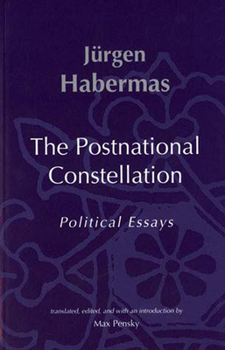The Postnational Constellation: Political Essays
Select Format
Select Condition 
Book Overview
translated, edited, and with an introduction by Max Pensky Does a global economy render the traditional nation-state obsolete? Does globalization threaten democratic life, or offer it new forms of expression? What are the implications of globalization for our understanding of politics and of national and cultural identities? In The Postnational Constellation, J rgen Habermas addresses these and other questions. He explores the historical and political origins of national identity, the achievements and catastrophes of the twentieth century, the future of democracy in the wake of the era of the nation-state, the political and moral challenges facing the European Union, and the status of global human rights in the ongoing debate on the sources of cultural identity. In their scope, critical insight, and clarity, the essays present a powerful vision of the contemporary political scene and the opportunities and challenges facing us. Those new to Habermas's work will find in this book a lucid and engaging introduction to one of the twentieth century's most influential thinkers. Those familiar with Habermas's writings will appreciate the application of his social and political theories to current political realities.
Format:Paperback
Language:English
ISBN:0262582066
ISBN13:9780262582063
Release Date:March 2001
Publisher:MIT Press
Length:210 Pages
Weight:0.70 lbs.
Dimensions:0.5" x 6.0" x 9.0"
Age Range:18 years and up
Grade Range:Postsecondary and higher
Customer Reviews
1 rating
Gets me interested in political philosophy
Published by Thriftbooks.com User , 23 years ago
I started noticing the works of Habermas because of his discourse ethics and its affinity with Kant's position. I never really had much interests in political / social philosophy (e.g. Locke, Hobbes, Marx, Weber, Freud, etc.) but this book changed me.The issue addressed by the keynote essay 'Postnational Constellation' explores the problem of the possibility of democracy in the process of globalization (esp. in Europe) where the traditional power of the nation states-- the traditional home of democracy-- continues to decline. While this might not be a very important problem say 50 years from now, the analysis is very interesting to me because:1. It emphasizes the importance of 'normative basis' in social-political debates. 2. It incorporates many insightful (at least to me) observations of empirical historical trends with normative considerations. 3. Habermas is a real thinker!After reading the book, which also includes a short summary of his account of the history of the philosophical idea of modernity and a short essay concerning human rights among other works, I am now interested in Habermas' social / political theory as expounded in his other books Facts and Norms and the Inclusion of Others.A side-note: Habermas' shorter essay Against Human Cloning is not as well-argued as other essays in the collection.





